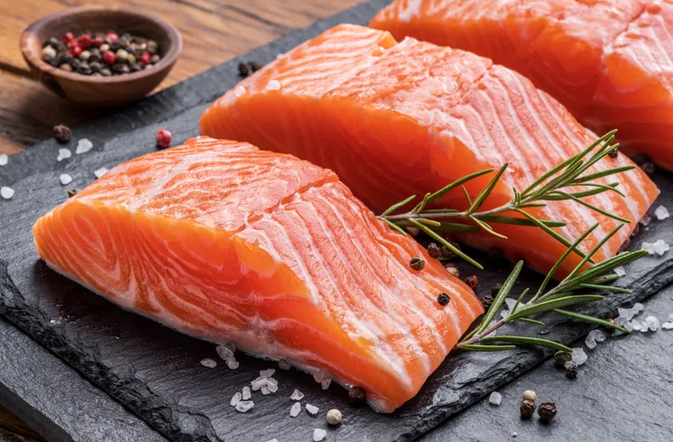Hong Kong – A team of Chinese researchers has found the coronavirus that causes Covid-19 can survive for more than a week on the surface of chilled fresh salmon, raising implications that it could be a source of international transmission.
The experiment discovered that the virus remained infectious for eight days after being kept at a temperature of 4 degrees Celsius. The experiment also found that Sars-CoV-2, the official name for the virus, remained infectious on the salmon for two days at 25 degrees, which the researchers called “regular room temperature”.
Salmon is typically kept at 4 degrees in markets, restaurants and during transport, extending the virus’s lifespan by six days. High-quality salmon can be moved across the world in a matter of days. For instance, Chile’s fishing authority said last year that salmon could reach Shanghai in two-and-a-half days.“Under such condition, (coronavirus) contaminated fish from one country can be easily transported to another country within one week, thus serving as one of the sources for international transmission,” said the Chinese scientists led by Dr Dai Manman in a non-peer-reviewed paper published in biorxiv.org.
“This calls for strict inspection or detection of (the coronavirus) as a critical new protocol in fish importation and exportation before allowing sales.”
Two of China’s coronavirus outbreaks – the initial outbreak in Wuhan and a later spread in Beijing in June – have both been associated with wet markets that sold seafood.
The first strain of SARS-CoV-2 was detected in the Huanan Seafood Market in Wuhan at the end of last year. Numerous international studies suggested the virus emerged elsewhere, most likely outside Wuhan.
China temporarily halted salmon imports in mid-June after the virus was reportedly discovered discovered on salmon chopping boards at Xinfadi market, the centre of the Beijing outbreak. Authorities later ruled out salmon as the source of transmission.
The cases in Wuhan and Beijing created “concerns that fish or meat-attached SARS-CoV-2 could be a potential source of Covid-19 transmission,” wrote Dai, associate professor with the South China Agricultural University in Guangzhou.
Additionally, the scientists cited other countries finding SARS-CoV-2 on meat or in meatpacking employees as a reason to investigate the virus’s survival time on salmon.
China imported about 40,000 to 100,000 tons of salmon each year before the pandemic, according to various estimates from the fishing industry, which made it one of the world’s largest salmon markets. Chile, Norway, Vietnam and Australia are the largest sources of salmon.
The coronavirus outbreaks in these countries varied. Norway reported 11,521 cases as of Tuesday while Chile recorded 424,274.
The researchers bought the fish from a shop in Guangzhou, cut the meat into small cubes and treated them with a solution containing the viral particles before storing the cubes at different temperatures. Each day a sample was taken out for a test to see if the virus could infect normal cells.
Experts believe the lower the temperature, the longer the virus could survive, but whether these products remained infectious was unknown. The salmon experiment suggests they are.
Chinese Customs has caught coronavirus in numerous imported food products ranging from shrimp to chicken wings. All these products were transported in temperatures far below freezing.
The government of the southern province of Guangdong said last month that it was unable to retrieve living strains from meat samples collected during containment efforts that had traces of the virus.
Other scientists have also tested how long the coronavirus can survive on different animal tissues.
A recent study by the US military showed the virus could stay infectious for at least two weeks on pigs’ skin at 4 degrees, and four days at room temperature.
Consumption of salmon and other imported seafood in China dropped sharply after the outbreak in Beijing in June, according to mainland media reports.
Business in some Japanese restaurants, where raw salmon is a common ingredient, dropped more than 99 per cent. A Japanese restaurant owner told Beijing Television on Monday that diners have started to return and the business would resume selling imported salmon this week.
Fudan University virologist Jiang Shibo supervised the experiment. Professor Liao Ming, director of the laboratory of prevention and control of animal diseases at the Ministry of Agriculture, was also a co-author of the study. (SCMP)

